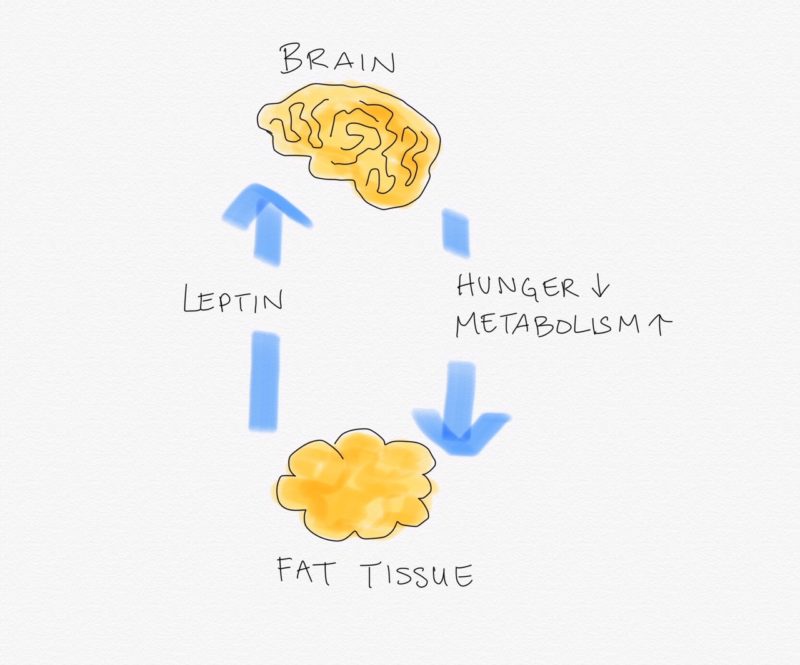The body set point theory suggests your body has an established and predetermined weight range where it feels very comfortable. Throughout your life, your brain will work very hard to maintain a weight within this range. A thermostat is often used as an analogy to explain this theory. Your body likes it at a comfortable 150 pounds. If you “cool off” (lose weight) the brain works very hard to warm you back up by increasing hunger hormones and decreasing your metabolic rate and desire to burn energy through activity. If you begin to “heat up” (gain weight) the opposite occurs. This theory explains why many people successfully lose weight at the beginning of a new diet or exercise program, only to struggle to maintain that weight loss over time. In contrast, it also explains why people come home from an over indulging vacation a few pounds heavier, but find themselves feeling full or motivated to exercise in the following days to weeks, bringing themselves back to their baseline weight without a lot of effort. While not definitively proven, there is mounting evidence that a set point regulating body weight exist.
Sounds easy enough, right? If this is true, why do so many people struggle to maintain a healthy weight for life? Multiple studies have suggested while it’s challenging to lower your body’s set point, it may not be as difficult to raise it. Leptin, a satiety hormone released by fat cells, decreases in a state of starvation or fasting, which signals within the body a desire to eat more. When leptin levels are low, your appetite increases and energy expenditure, or metabolism, goes down in order to prevent further weight loss. This makes sense as a protective and adaptive mechanism. However, it doesn’t appear there is an equivalent reaction in response to weight gain. In other words, you might struggle through restrictive dieting and excessive exercise to convince your brain that your 150-pound body should weight 130 pounds. But you may not struggle as hard to convince it you should weight 180 pounds. This also makes sense, because historically speaking it wasn’t until recently that humans had to worry about an overabundance of food. A limited food supply such as that of a famine, war-time starvation, or sparse food supply was what our bodies were designed to compensate for.
Leptin is only one example of many hormones and mechanisms that affect hunger and body weight. Our bodies were designed to eat and move based on responses to these signals. However, we have adapted largely to ignore these signals and rather eat based on the time of day, easy access to quick meals, and a multitude of other factors that have nothing to do with how hungry we are. The fact that we have unlimited access to unhealthy, highly palatable foods that are easy to overconsume only exacerbates this problem. In general, we are also much less active as a society. All of this, and the likelihood that our bodies have the potential to increase our set point but not lower it could explain why so many struggle with losing and maintaining a healthy weight.

So what does this mean? If the body fights weight loss but allows slow and progressive weight gain, does this mean for the obese individual achieving a healthy weight is impossible? No, at least I don’t believe it does. It does mean if you’re obese and have struggled and failed to lose weight, it’s not because you’re lazy or a failure. Your body works very hard to keep you from losing weight and you are constantly fighting an uphill battle. Simply knowing that is a starting point to design an individual plan for optimal health. Understand too, optimal health is not measured solely in pounds. In fact, it is possible to be overweight and metabolically healthy, as well as skinny and metabolically unhealthy.

For those who are above their desired weight, but overall healthy, it could mean you need to change your focus and goals. If your body is comfortably resting at its natural set point, it may be time to decide you’re not going to fight that any longer. Perhaps your body wasn’t designed to be a size 6, despite our media and diet culture telling you that’s possible for everyone. Do you want to indefinitely deprive yourself of enjoyable foods and exercise excessively just to drop a few sizes, knowing it will be a constant struggle to stay there? Or do you want to enjoy better health, longevity, and less anxiety around food while exercising for enjoyment, a challenge or improved strength all while feeling satisfied with a healthy body weight?

If you need to lose weight for health purposes, it may mean your focus needs to change from restrictive eating (aka starving), yo-yo dieting, and exercise plans you hate and instead focus on intuitive eating, learning to listen to your body’s signals, and finding exercises and movements that are enjoyable and sustainable. This is not what diet culture, your trainer at the gym, or even your healthcare provider may have told you, but it’s true.

Let your next “weight loss” plan be one that teaches you how to eat food for enjoyment, in a quantity that satisfies you, and that includes less of what makes you feel bad and more of what makes you feel good. Research intuitive eating and learn what this means. Change the word “exercise” in your mind to “movement.” Find movements you enjoy, whether it’s walking the dog, walking with coworkers during lunch, or a group class at the gym. Every once in a while do something that challenges you. Maybe you enjoy an intense workout 5 days a week by yourself or with a trainer, sometimes that’s me. But that certainly isn’t for everyone and it’s not required. Once you learn what movement your body enjoys, listen to those signals that tell you it’s time to move more. You don’t need another “weight loss” plan, you need a healthy for life plan. Stay tuned to Village Farm Life for more resources to help.





